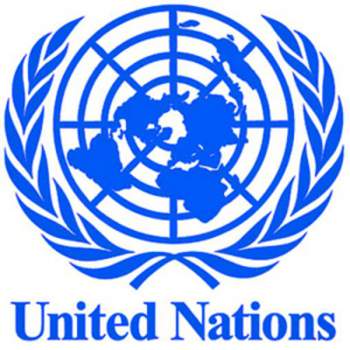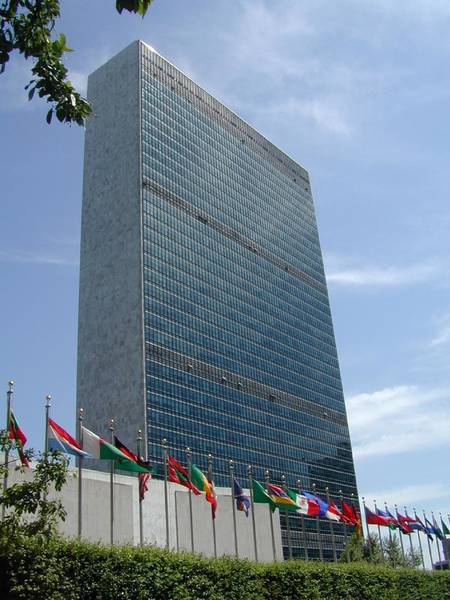
United Nation

The United Nations is an international organization which “aims to facilitate cooperation in international law, international security, economic development, social progress, human rights, and achieving world peace.” The United Nations was founded in 1945 after WWII and it replaced the League of Nations. The purpose of the United Nations during its creation was to end wars between nations and give countries a forum for dialogue between each other. The United Nations currently boasts 192 member states, which includes nearly every recognized independent state in the world. The United Nations has its headquarters in New York City and the building is considered international territory. The United Nations is divided into five administrative bodies; The General Assembly which is the main deliberative body, the Security Council which decides certain resolutions for peace and security, The Economic and Social Council which aids in promoting international economic and social cooperation and development, the Secretariat which provides studies, information and facilities needed by the United Nations, and last but certainly not least is the International Court of Justice which serves as the primary judicial organ.
The United Nations was the successor to the League of Nations which was for the most part considered to be an incompetent organization and was not an effective governing body. In April of 1954, the United Nations Conference of International Organization began in San Francisco. 50 governments and many non governmental organizations such as Rotary International and Lions Clubs International all helped in drafting the Charter of the United Nations. In October of 1945 the United Nations became official after the Charter of the United Nations was ratified by the five permanent members of the United Nations Security Council and by a majority of the 46 other member states. These countries in the United Nations Security Council were France, the Republic of China, the Soviet Union, the United Kingdom, and the United States. The first meeting of the General Assembly took place in Westminster Central Hall in London, the location has since moved to the United Nations building in New York City.
 The United Nations has had considerable success in the social arena, fostering human rights, economic development, decolonization, health, education, assisting refugees, and ensuring fair trade. The United Nations is quite remarkable, as they were able to garner such support and confidence from the very beginning. While there have still been wars, threats on international security, genocides, and a slew of other problems one cannot dismiss the effect that the United Nations has had. There may always be problems, however they would be magnified and multiply if it weren’t for international bodies such as the United Nations and their ability to facilitate discussion and dialogue among member states.
The United Nations has had considerable success in the social arena, fostering human rights, economic development, decolonization, health, education, assisting refugees, and ensuring fair trade. The United Nations is quite remarkable, as they were able to garner such support and confidence from the very beginning. While there have still been wars, threats on international security, genocides, and a slew of other problems one cannot dismiss the effect that the United Nations has had. There may always be problems, however they would be magnified and multiply if it weren’t for international bodies such as the United Nations and their ability to facilitate discussion and dialogue among member states.
The United Nations is an organization that includes every government on earth. Each country in the United Nations is referred to as a member state and form the United Nations General Assembly. The United Nations General Assembly is one of the five man facets of the United Nations. The United Nations General Assembly oversees the budget of the UN, appoints the non-permanent members of the Security Council, receive reports from other parts of the UN, and make recommendations in the form of General Assembly Resolutions. The United Nations General Assembly meets under its president or secretary general in regular yearly sessions from September to December. Though those are the usual meeting times, they reconvene for special and emergency sessions. The United Nations General Assembly will vote on important world decisions such as recommendations on peace and security, election of members to organs, admission, suspension, and expulsion matters.
The General Assembly will vote n many resolutions brought forth by sponsoring states. These resolutions are usually symbolic statements surrounding a world issue; they can range anywhere to the proliferation of arms to ending genocide. A major disadvantage to the United Nations General Assembly is the lack of a legal and binding contract. While the United Nations General Assembly is representative of the international community, they have no real authority in enforcing laws and resolutions. However, the United Nations General Assembly does have a great deal of power and the notion that they are an organization that cannot enforce anything is false and should be disregarded. Furthermore, the United Nations General Assembly have the authority to take final decisions in areas such as the budget, but resolutions passed by the United Nations General Assembly may also be constitutive or proof of international customary law and therefore binding on the member states.
Within the United Nations General Assembly, there are six main sub committees; The First Committee: Disarmament and International Security, The Second Committee: Economic and Financial, The Third Committee: Social, Cultural, and Humanitarian, The Fourth Committee: Special Political and Decolonization, The Fifth Committee: Administrative and Budgetary, and The Sixth Committee: Legal.
While there are regularly scheduled meetings for the United Nations General Assembly, they may convene for special sessions. For instance, they may meet at the request of the United Nations Security Council; another special session was for the Millennium Development Goals. There are also emergency special sessions that convene during times of urgency and will meet many times within the next one or two days regarding matters of international peace and security.
The United Nations General Assembly is truly a stunning body of people and we owe them a great deal for being able to change the world. While there many always be problems in the world, the United Nations General Assembly has been able to thwart certain issues from coming into play and it has also offered a forum for world leaders to discuss matters at hand and attempt to resolve any problems they may have.











